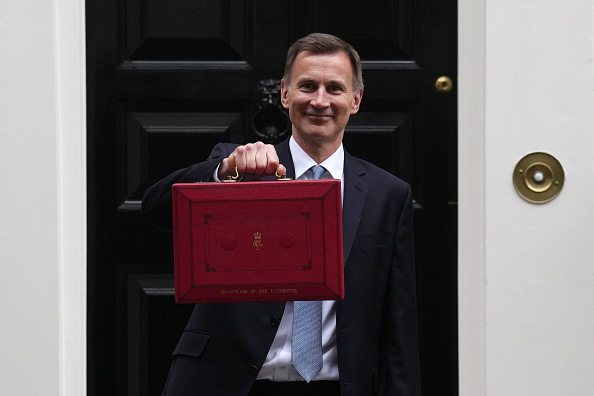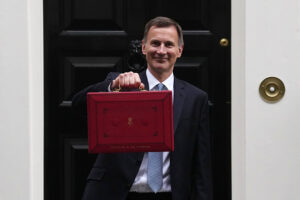Spring Budget 2024 – what’s in it for small businesses?
By Anna Jordan on Small Business UK - Advice and Ideas for UK Small Businesses and SMEs Against a difficult financial landscape, we take a look at what small businesses want from the Spring Budget 2024 The post Spring Budget 2024 – what’s in it for small businesses? appeared first on Small Business UK.

By Anna Jordan on Small Business UK - Advice and Ideas for UK Small Businesses and SMEs

The Chancellor is set to announce the Spring Budget 2024 in the coming days.
Being the last Spring Budget before the next General Election, this one is crucial. Jeremy Hunt doesn’t have as much to spend as he expected, but there’s been word of an Inheritance Tax scrap, an increase in the child benefit threshold and a 99 per cent mortgage.
What will be in it for small businesses? We’ll be taking a look at what’s been floated so far, plus some items on entrepreneurs’ wishlists.
What is the date for the Budget 2024?
The Spring Budget will be on March 6, 2024.
What time is Budget 2024 expected to take place?
The Chancellor normally delivers his statement after Prime Minister’s Questions, which typically finish at 12.30pm.
How do I watch the Spring Budget?
The Budget will be broadcast live on BBC television and streamed on ParliamentTV.
What can small business expect from the Spring Budget 2024?
Though we’re not 100 per cent sure of what’s going to come out of the day, here are some key topics that the Chancellor could address.
Bringing back VAT-free shopping for international shoppers
There’s talk of a reversal of the decision to scrap VAT-free shopping for tourists. Rishi Sunak introduced the move in 2020 when he was Chancellor. It’s since been lambasted by retailers and leisure firms for losing the UK billions of pounds in sales.
The Office for Budget Responsibility (OBR) will examine the costs and benefits of scrapping the scheme and their findings will be presented alongside the Budget announcement.
Reduce National Insurance for people looking for employment
Wealth Club investors suggested cutting the rate for certain groups where the government is keen to increase employment – in particular those over the age of retirement or with disabilities. This could create incentives for employers to actively recruit from groups they currently struggle to reach.
A replacement for Recovery Loan scheme
In 2023, two separate studies found that over a quarter (26 per cent) of UK businesses had struggled to access finance via traditional banks, and fewer than two in five (37 per cent) consider the process for seeking finance ‘easy’. “However, this line of support is coming to an end in June 2024 and therefore poses further challenges to firms seeking quality funding,” said Mike Randall, CEO of Simply Asset Finance.
With business insolvencies reaching a 30-year high in January this year, the Spring Budget should be a key moment for the government to consider how SMEs can be given the funding support they need to thrive. “The continuity of support, such as RLS, should be a key strand in this consideration, but there must also be structural, systemic change to ensure we don’t see a repeat of January’s figures,” he said.
Increase VAT threshold
Under current legislation, there is an £85,000 VAT threshold for businesses exceeding a taxable turnover of over £85,000 within 12 months, which will be in place until March 2026.
This means that some small businesses deliberately keep their taxable turnover below the threshold so they don’t have to pay VAT. In fact, 43 per cent of firms with a turnover of less than £85,000 say they are concerned about growing revenue beyond this specifically because of the requirement to pay VAT, according to the BCC Insight Unit. This in turn slows down the UK’s economic growth.
“Historically, [the VAT threshold] used to increase in line with inflation, but has remained unchanged since April 2017. If this had continued to increase as previously, the Chartered Institute of Taxation estimates the threshold would sit at £103,000 as of 2023,” said Randall.
“As a result, there are a significant number of businesses sitting underneath the VAT, holding off on further growth because of the additional administrative and cost burden of entering the VAT threshold. While there have been positive talks to increase the threshold from £85,000 to £100,000, this is no silver bullet solution and we could see a similar situation recurring in future.
“We encourage the Chancellor to carefully review the VAT threshold to ensure it doesn’t stifle business growth, but also consider how to reduce the initial impact of entering the threshold as cost pressures remain high.”
ACCA points out that the VAT threshold is a particular area of concern for small and medium-sized enterprises (SMEs), especially in already troubled sectors. With inflation running so high over the last couple of years, any frozen threshold will bring more individuals and business into higher tax brackets – often for the first time – meaning they will have to register and file tax returns, creating more work for HMRC at a time when its service levels are buckling.
Reduce National Insurance Contributions (NICs) for employers
“Cutting employers’ NICs across the board would be welcomed by all businesses,” said Toby Tallon, tax partner at Evelyn Partners. “If more targeted cuts are required this could be aimed at the first 10 employees for a business or relief in respect of employers NICs for all employees in small businesses.” He added that businesses that are exempt from audit typically have fewer than 50 employees.
Reform business rates
Business rates are ever-present on a Budget wishlist, but proper reform has never come to fruition. The business rates multiplier will be unfreezing on April 1, 2024. As a result, the majority of businesses will see their business rates bill go up by 6.7 per cent despite the value of the assessment remaining the same.
Research from the BCC Insight Unit also found that over a quarter of companies (26 per cent) say they have changed plans to upgrade or open premises as a direct result of business rates. What’s more, 38 per cent of responding businesses say they are now paying more following the 2023 rates revaluation.
Broadband contracts
Along with so many other bills, the price of broadband has shot up. Les Roberts, business comparison expert at Bionic, wants the government to stop above-inflation hikes that kick in mid-contract: “The price of contracts have increased by 17 per cent over the past year,” he said.
Extended energy bill support
Businesses also want to see an extension to energy support: “As the current Energy Bill Discount Scheme is expected to end on March 31, many businesses are calling for an extension of this as the energy market remains volatile,” said Roberts.
Bira wants to go a step further and release businesses from sky-high energy contracts. “Given the recent fall in energy prices, Bira calls for immediate action to liberate businesses from expensive energy contracts,” the organisation said. “This proactive step will alleviate financial burdens on retailers, enabling them to redirect resources toward growth and sustainability.”
Join us on March 6 for additional coverage of the Spring Budget
Read more
What is the VAT threshold? – At what point does your small business have to start paying VAT? Should you voluntarily pay VAT? And what are legitimate ways to stay under the VAT threshold?
7 ways to reduce your corporation tax bill – All limited companies must pay corporation tax on the profits they make, but there are entirely legitimate ways to reduce the amount you pay says James Johnson, a partner at Hillier Hopkins
7 electricity suppliers for small businesses – We provide information on seven electricity suppliers, looking at their green credentials, affordability and customer service
The post Spring Budget 2024 – what’s in it for small businesses? appeared first on Small Business UK.






















